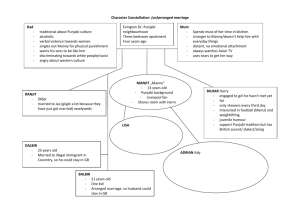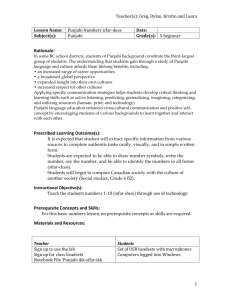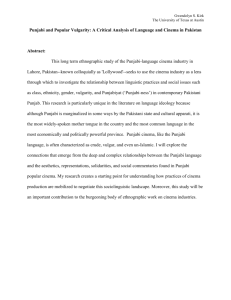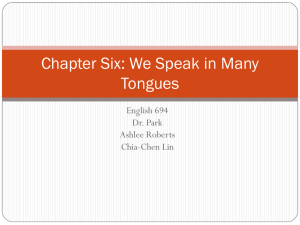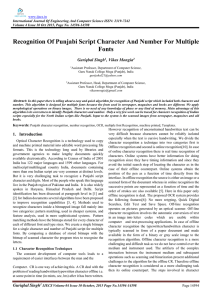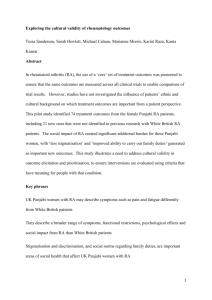DTDLdiscussant notesSeminar4
advertisement
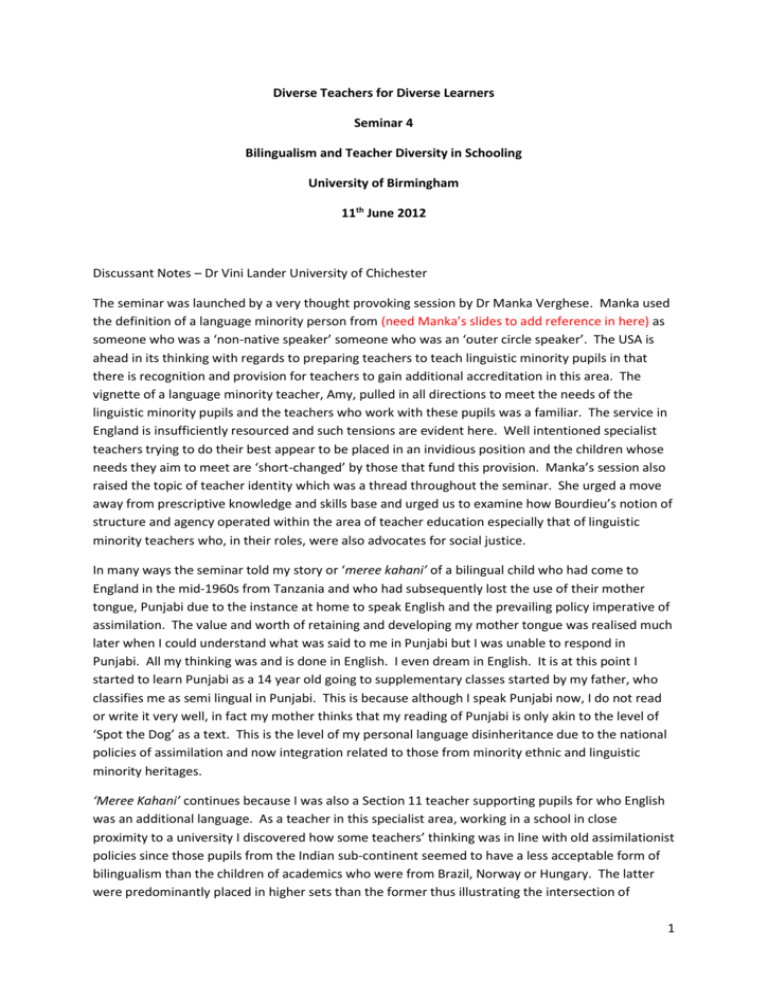
Diverse Teachers for Diverse Learners Seminar 4 Bilingualism and Teacher Diversity in Schooling University of Birmingham 11th June 2012 Discussant Notes – Dr Vini Lander University of Chichester The seminar was launched by a very thought provoking session by Dr Manka Verghese. Manka used the definition of a language minority person from (need Manka’s slides to add reference in here) as someone who was a ‘non-native speaker’ someone who was an ‘outer circle speaker’. The USA is ahead in its thinking with regards to preparing teachers to teach linguistic minority pupils in that there is recognition and provision for teachers to gain additional accreditation in this area. The vignette of a language minority teacher, Amy, pulled in all directions to meet the needs of the linguistic minority pupils and the teachers who work with these pupils was a familiar. The service in England is insufficiently resourced and such tensions are evident here. Well intentioned specialist teachers trying to do their best appear to be placed in an invidious position and the children whose needs they aim to meet are ‘short-changed’ by those that fund this provision. Manka’s session also raised the topic of teacher identity which was a thread throughout the seminar. She urged a move away from prescriptive knowledge and skills base and urged us to examine how Bourdieu’s notion of structure and agency operated within the area of teacher education especially that of linguistic minority teachers who, in their roles, were also advocates for social justice. In many ways the seminar told my story or ‘meree kahani’ of a bilingual child who had come to England in the mid-1960s from Tanzania and who had subsequently lost the use of their mother tongue, Punjabi due to the instance at home to speak English and the prevailing policy imperative of assimilation. The value and worth of retaining and developing my mother tongue was realised much later when I could understand what was said to me in Punjabi but I was unable to respond in Punjabi. All my thinking was and is done in English. I even dream in English. It is at this point I started to learn Punjabi as a 14 year old going to supplementary classes started by my father, who classifies me as semi lingual in Punjabi. This is because although I speak Punjabi now, I do not read or write it very well, in fact my mother thinks that my reading of Punjabi is only akin to the level of ‘Spot the Dog’ as a text. This is the level of my personal language disinheritance due to the national policies of assimilation and now integration related to those from minority ethnic and linguistic minority heritages. ‘Meree Kahani’ continues because I was also a Section 11 teacher supporting pupils for who English was an additional language. As a teacher in this specialist area, working in a school in close proximity to a university I discovered how some teachers’ thinking was in line with old assimilationist policies since those pupils from the Indian sub-continent seemed to have a less acceptable form of bilingualism than the children of academics who were from Brazil, Norway or Hungary. The latter were predominantly placed in higher sets than the former thus illustrating the intersection of 1 ethnicity, linguistic heritage and class. Nowadays I have been in a school which has a ‘no Polish’ in school policy because as one teacher explained, ‘you don’t know what they are talking about. It could be anything’. Such suspicion and control pervades the subtext of the debate about bilingualism related to the speakers of certain languages. When your language is neither welcome in school nor your proficiency in it recognised by the school and you have to gain an understanding of it on Saturdays or Sundays at your supplementary school is the danger of creating ‘semi-lingual learners’ not increased? Your functioning in both languages is not highly proficient, therefore, understanding concepts that use academic language and complex language structures in the second language may be partially understood and in everyday life the nuances of second language use may be difficult to understand in some cases. Jean Conteh illustrated how teacher identity, agency and sheer determination can be used to assert your own identity through the use of your mother tongue in the classroom. The use of Punjabi in a mainstream primary Geography lesson showed how one teacher’s security in her own identity as a person and as a teacher helped her to overcome any stigma associated with the use of first language to aid pupils’ understanding of a concept. Such an act requires courage. Both Jena and Manka stressed the value of theory in teacher preparation. The discussion groups also drew on this theme emphasising how theory is essential to understanding practice and vice versa. Jean showed this in her session by advocating the value of teachers as co-researchers. The notion of superdiversity as relayed to the seminar participants by Professor Adrian Blackledge my account for how the nature of linguistic diversity has changed and despite the unfavourable policy climate children and young people have adapted to the different and varying demands of communication across a range of media and spaces. ‘Komal’ one of the participants in a research study conducted at a complimentary Punjabi school by researchers in the MOSAIC Centre at the University of Birmingham shows her increasing grasp of crossing language domains from her carefree attitude to her lack of achievement in Latin at school to her proficiency to use Latin to distance her Punjabi teacher perhaps in terms of class and assert herself; to her clear grasp and understanding of Punjabi which is evident in her assertion that a phrase given to her is more Hindi than Punjabi. She demonstrates the heteroglossia which is evident in the way young people use language and how their identity does not appear to be solely dependent on the linguistic inheritance of their mother tongue. Can the policies of the past embedded in the subconscious of teachers be part of the outcomes related to the underachievement of some linguistic minority pupils? Is the hierarchy of bilingualism/multilingualism and monolingualising merely the outcomes of a new type of cultural imperialism? Or does initial teacher education and continuing teacher education need to rise above the knowledge/skills debate and grasp the nettle to ensure that theoretical concepts, such as heteroglossia are part and parcel of the curriculum? If I return to the notion of structure and agency then teacher agency is dependent on theoretical knowledge and understanding not just about what is taught (content), how it is taught (pedagogy) but who teaches it ad who they are, in other words it is knowing about teacher identity and who you are as a teacher. But in order to understand the position of linguistic minority learners the teacher has to understand the theory of language development and second language development as well as know and understand the notion of social justice and why it is essential teacher knowledge. Since 2 without such a theoretical construct the teacher can only be an instrument of policy. It is through the structured conversations which result through the discussions about theory and practice which can be initiated though co-researching with teachers that we can begin to develop teachers’ understanding of the importance of theory and how it empowers practice. It is such empowerment which leads to courage and all teachers need courage. To be an advocate for social justice requires courage on a daily basis as illustrated by Amy in Manka’s vignette. A very real example of such courage was provided by Vicki, a teacher participant at the seminar who in one of the group discussions shared how she encouraged a child to use his first language, Tamil to write down his ideas and how she could defend her professional decision to do so against the vociferous exclamations of her colleagues who said ‘what will Ofsted say?’ To do this and to use Punjabi in a multilingual classroom or even in a monolingual classroom requires professional courage. To implement a social justice framework in your teaching, to adhere to your belief in social justice and move beyond the policy structures and strictures requires professional courage. This courage does not appear from the ether and can only emerge and develop if teachers have a secure theoretical knowledge and understanding of what they do and why they do it. This can only arise from a secure and well found teacher identity. 3
